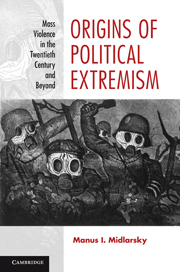Book contents
- Frontmatter
- Contents
- List of figures and tables
- Preface
- Introduction
- PART I Theory and Empirics
- PART II The Secular “Isms”
- PART III An Ostensibly Sacred “Ism”
- 6 Radical Islamism: Foundations
- 7 Contemporary Radical Islamist Movements
- 8 Muslims in India
- PART IV Extreme Nationalism
- PART V Conclusion
- References
- Index
6 - Radical Islamism: Foundations
Published online by Cambridge University Press: 05 June 2012
- Frontmatter
- Contents
- List of figures and tables
- Preface
- Introduction
- PART I Theory and Empirics
- PART II The Secular “Isms”
- PART III An Ostensibly Sacred “Ism”
- 6 Radical Islamism: Foundations
- 7 Contemporary Radical Islamist Movements
- 8 Muslims in India
- PART IV Extreme Nationalism
- PART V Conclusion
- References
- Index
Summary
Any comparison among the forms of extremism comes up against a formidable distinction between radical Islamism and the remaining types such as fascism or communism. The latter two avowedly secular ideologies did not find their intellectual roots in sacred theologies (although Hitler did say at one point that in his viciously anti-Semitic policies he was “fighting for the Lord's work”). Indeed, one of the first acts of the Nazi regime was to demand the dissolution of the Catholic Center Party as the heretofore highly successful political instrument of 27 million German Catholics. In exchange, Hitler would allow the unfettered continuation of Catholic worship and education in the new, essentially pagan environment of Nazism. Neither the political imagery nor the ideation of Nazism or Italian Fascism was rooted in the sacred. Mussolini took pains to limit the Vatican's political and ecclesiastical influence in fascist Italy. Of course, among the first activities of the victorious Bolsheviks was the looting and destruction of Orthodox churches and monasteries, to such a vigorous extent that it took the untiring efforts of Anatole Lunacharsky, the Bolshevik minister of culture (and of Jewish origin), to rescue major Christian historical antiquities.
In stark contrast, radical Islamists routinely cloak their pronouncements and activities in the language of Islam. Virtually all of bin Laden's statements, long or short, include mention of Allah, the Prophet Muhammad, or some reference to jahiliyyah, the state of Arab ignorance prior to Muhammad's arrival, which, according to Sayyid Qutb, is now revived in the form of duplicitous and corrupt ostensibly Muslim rulers of predominantly Islamic countries.
- Type
- Chapter
- Information
- Origins of Political ExtremismMass Violence in the Twentieth Century and Beyond, pp. 143 - 160Publisher: Cambridge University PressPrint publication year: 2011



